![The Hidden Fortress (4K UHD) [Blu-ray] [Region A & B & C]](/pictures/1168908.jpg) The Hidden Fortress (4K UHD) | Blu Ray | (18/08/2025)
from £24.98
| Saving you £N/A (N/A%)
| RRP
The Hidden Fortress (4K UHD) | Blu Ray | (18/08/2025)
from £24.98
| Saving you £N/A (N/A%)
| RRP New 4K Restoration of Kurosawa's much-loved classic. A story of rival clans, hidden gold and a princess in distress, The Hidden Fortress is a thrilling mix of fairy story and samurai action movie. It was Kurosawa's first film shot in the widescreen process of Tohoscope, and he exploited this to the full in the film's rich variety of landscape locations, including the slopes of Mount Fuji. The Hidden Fortress became Kurosawa's biggest box office hit to date and won several awards, including the Golden Bear at the 1959 Berlin Film Festival. Some twenty years on, the film's influence would have even greater impact on the world's box office, when George Lucas borrowed elements of its plot for the first of his Star Wars series. Extras Restored 4K (2160p) UHD Blu-ray presentation in Dolby Vision (HDR10 compatible) Newly recorded audio commentary by Japanese-cinema expert Tony Rayns Akira Kurosawa: It is Wonderful to Create Hidden Fortress (2002) Interview with George Lucas (2001, 8 mins) Original trailer **FIRST PRESSING ONLY** Illustrated booklet with a new essay on the film by Kenta McGrath
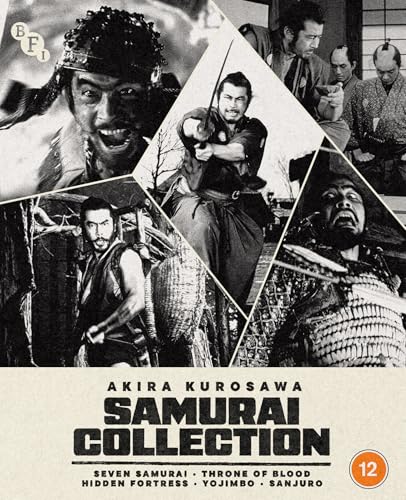 Akira Kurosawa Samurai Collection (Blu-ray) | Blu Ray | (01/12/2025)
from £43.98
| Saving you £N/A (N/A%)
| RRP
Akira Kurosawa Samurai Collection (Blu-ray) | Blu Ray | (01/12/2025)
from £43.98
| Saving you £N/A (N/A%)
| RRP His influence on filmmakers throughout the entire world is so profound as to be almost incomparable' Martin Scorsese Akira Kurosawa is one of the world's greatest filmmakers. His films have been acclaimed by critics and audiences the world over, and his celebrated samurai epics featuring international star Toshiro Mifune have inspired filmmakers as diverse as Steven Spielberg and Sergio Leone, and countless films, including The Magnificent Seven and Star Wars. This indispensable collection contains recently remastered presentations of five of Kurosawa's greatest films, accompanied by a wealth of extras features including documentaries, interviews, audio commentaries and original theatrical trailers. Extras 6-disc set featuring five classic Kurosawa films in High Definition Akira Kurosawa: It is Wonderful to Create (2002, 195 mins): five episodes of the Toho Masterworks series split over five discs, that take an in-depth look at each of the films included in this collection. Each episode includes interviews with not only Kurosawa himself but a host of cast and crew. Audio commentary on Seven Samurai by film critic Adrian Martin Philip Kemp selected scenes commentary on Seven Samurai (1999, 20 mins): film critic and writer Philip Kemp analyses key scenes from the film. The Art of Akira Kurosawa (2013, 49 mins): Asian-cinema expert Tony Rayns discusses Kurosawa's career and influence My Life in Cinema (1993, 116 mins): a conversation between filmmakers Akira Kurosawa and Nagisa Oshima filmed for the Directors Guild of Japan in 1993 - the two legendary directors discuss Kurosawa's life, career and legacy Introduction to Throne of Blood by Sir Ian McKellen (2016, 2 mins) Introduction to Throne of Blood by Mamoun Hassan (2012, 7 mins): the late writer, director, and producer introduces a screening of Akira Kurosawa's film at the BFI Southbank Audio commentary on Throne of Blood by Japanese film expert Michael Jeck Macbeth (1945, 16 mins): two scenes from Shakespeare's famous Scottish tragedy, with Wilfrid Lawson and Cathleen Nesbitt as a fine murderous duo Audio commentary on The Hidden Fortress by Japanese-film expert Tony Rayns BFI Screen Epiphanies: Steven Berkoff (2015, 18 mins): in a wide-ranging discussion with journalist Ian Hadyn Smith, the actor, writer and theatre director reflects on The Hidden Fortress, the talents of Toshiro Mifune and his first viewing of the film in the late 1950s Interview with George Lucas (2001, 8 mins) Original trailer Sword For Hire (2024, 25 mins): Kurosawa scholar Jasper Sharp discusses Yojimbo and Sanjuro in this analytical assessment Audio commentary on Yojimbo by film critic Philip Kemp Introduction to Sanjuro (2003, 5 mins): filmmaker Alex Cox introduces Sanjuro Audio commentary on Sanjuro by Japanese-Australian filmmaker Kenta McGrath Out of the Dust Storm and into the Koi Pond (2025, 18 mins): Nic Wassell considers the role of nature as a background to the machinations of mankind in role of nature as a background to the machinations of mankind in Yojimbo and Sanjuro Alex Cox on Kurosawa (2003, 9 mins): the director discusses the life and work of Akira Kurosawa Original Japanese trailers Seven Samurai trailer (2024) Image galleries for Seven Samurai, Yojimbo and Sanjuro
![Kurosawa Samurai Collection [Blu-ray]](/pictures/1132035.jpg) Kurosawa Samurai Collection | Blu Ray | (01/09/2014)
from £48.50
| Saving you £11.49 (23.69%)
| RRP
Kurosawa Samurai Collection | Blu Ray | (01/09/2014)
from £48.50
| Saving you £11.49 (23.69%)
| RRP The films of Akira Kurosawa one of the cinema's greatest auteurs have had a profound effect on audiences around the world and his acclaimed samurai epics - featuring international star Toshirô Mifune - have inspired filmmakers a diverse as George Lucas and Sergio Leone. This collection marks the first time all these seminal films have been available on High Definition blu-ray in the UK. Seven Samurai (1954)When the residents of a small Japanese village seek protection they hire seven unemployed ronin' (masterless samurai). Paid only in handfuls of rice the samurai remain distant from the villagers knowing that their assignment may prove to be fatal. Unanimously hailed as one of cinema's greatest masterpieces Seven Samurai has inspired countless films including The Magnificent Seven. Japan | 1954 | 190 minutes | Original aspect ratio 1.33:1 Throne of Blood (1957)In this brilliant re-imagining of Shakespeare's Macbeth Toshirô Mifune plays a samurai fated to betray his friend and master in exchange for the prestige of nobility. Kurosawa's bloody tale is a triumph of economic style and the climactic battle scene is full of remarkable and brutal imagery. Japan | 1957 | 104 minutes | Original aspect ratio 1.33:1 The Hidden Fortress (1958)In this classic collaboration between Kurosawa and star Mifune a warrior and a princess try against all odds to return to their homeland with their fortune. Acknowledged by George Lucas as the inspiration for Star Wars The Hidden Fortress combines an epic tale of struggle and honour with modern comic sensibilities to masterful effect. Japan | 1958 | 138 minutes | Original aspect ratio 2.35:1 (16x9 enhanced) Yojimbo (1961)A drifting samurai for hire plays both ends against the middle with two warring factions surviving on his wits and his ability to outrun his own bad luck. Eventually the samurai seeks to eliminate both sides for his own gain and to define his own sense of honour. Yojimbo provided inspiration for A Fistful of Dollars. Japan | 1961 | 106 minutes | Widecreen 4:3 format Sanjuro (1962)After the success of Yojimbo Kurosawa teamed up once again with Mifune one year later to make this comedy of manners. The film which follows a man fighting corruption in local government offers a twist on the classic Samurai tale by gently but perfectly parodying the conventions of the Japanese period action movie tradition. Japan | 1962 | 95 minutes | Original aspect ratio 2.35:1 (16x9 enhanced)
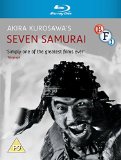 Seven Samurai (Blu-ray Edition) | Blu Ray | (25/08/2014)
from £18.98
| Saving you £3.00 (17.66%)
| RRP
Seven Samurai (Blu-ray Edition) | Blu Ray | (25/08/2014)
from £18.98
| Saving you £3.00 (17.66%)
| RRP One of the greatest films ever made – Akira Kurosawa’s Seven Samurai has influenced the work of directors from George Lucas to Steven Spielberg and spawned remakes such as John Sturges’ acclaimed The Magnificent Seven. With their village raided every year by vicious bandits a group of peasants hire seven warriors to protect them. Initially met with suspicion the warriors eventually gain the trust of the peasants and they join forces to face the bandits. This special edition includes alternative presentations of the film a new and exclusive interview with Asian cinema expert Tony Rayns and the film’s original Japanese trailer. Endlessly copied but never surpassed Seven Samurai is a truly timeless classic. Contents: Digitally re-mastered in High Definition Play with or without original intermission Original Japanese theatrical trailer The Art of Akira Kurosawa (2013 49 mins): Asian cinema expert Tony Rayns discusses Kurosawa’a career and influence Fully illustrated booklet with essays and credits
![Seven Samurai [1954]](/pictures/1004703.jpg) Seven Samurai | DVD | (22/11/1999)
from £14.98
| Saving you £5.01 (33.44%)
| RRP
Seven Samurai | DVD | (22/11/1999)
from £14.98
| Saving you £5.01 (33.44%)
| RRP Unanimously hailed as one of the greatest masterpieces in the history of the motion picture, Seven Samurai has inspired countless films modelled after its basic premise. But Akira Kurosawa's classic 1954 action drama has never been surpassed in terms of sheer power of emotion, kinetic energy, and dynamic character development. The story is set in the 1600s, when the residents of a small Japanese village are seeking protection against repeated attacks by a band of marauding thieves. Offering mere handfuls of rice as payment, they hire seven unemployed "ronin" (masterless samurai), including a boastful swordsman (Toshiro Mifune) who is actually a farmer's son desperately seeking glory and acceptance. The samurai get acquainted with but remain distant from the villagers, knowing that their assignment may prove to be fatal. The climactic battle with the raiding thieves remains one of the most breathtaking sequences ever filmed. It's poetry in hyperactive motion and one of Kurosawa's crowning cinematic achievements. This is not a film that can be well served by any synopsis; it must be seen to be appreciated and belongs on the short list of any definitive home-video library. --Jeff Shannon
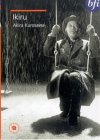 Ikiru | DVD | (06/10/2003)
from £18.75
| Saving you £1.24 (6.61%)
| RRP
Ikiru | DVD | (06/10/2003)
from £18.75
| Saving you £1.24 (6.61%)
| RRP ""Sometimes I think of my death "" wrote Akira Kurosawa ""I think of ceasing to be... and it is from these thoughts that Ikiru came."" The story of a man diagnosed with stomach cancer Kurosawa's film is a serious contemplation of the nature of existence and the question of how we find meaning in our lives. Opening with a shot of an x-ray showing the main character's stomach 'Ikiru' tells the tale of a dedicated downtrodden civil servant who diagnosed with a fatal cancer learns to c
![Rashomon [1950]](/pictures/1078426.jpg) Rashomon | DVD | (13/10/2008)
from £20.00
| Saving you £-0.01 (N/A%)
| RRP
Rashomon | DVD | (13/10/2008)
from £20.00
| Saving you £-0.01 (N/A%)
| RRP Famously, Rashomon - which won both the Golden Lion in Venice and the Oscar for Foreign-Language Film - introduced Western audiences to Japanese cinema in general and to the thrilling artistry of Akira Kurosawa in particular.
![Shogun Assassin [1981]](/pictures/1004559.jpg) Shogun Assassin | DVD | (21/02/2000)
from £6.70
| Saving you £13.29 (198.36%)
| RRP
Shogun Assassin | DVD | (21/02/2000)
from £6.70
| Saving you £13.29 (198.36%)
| RRP THIS VERSION BANNED SINCE 1983 - IS AT LONG LAST APPROVED UNCUT! Astonishingly violent - Shogun Assassin tells the story of Lone Wolf a powerful and feared Masterless Samurai who lives a peaceful existence with his wife and his son. When he refuses to swear allegiance to Kurando the most vicious Shogun in Japanese history Kurando orders the death of Lone Wolf's wife Azame. Blinded by rage Lone Wolf vows to avenge her death taking his son with him on the path of darkness and retribution. Soon Lone Wolf's sword of vengeance is unleashed upon the evil Shogun's sons ALL WHO GET IN HIS WAY and ultimately the legendary Master's of Death!
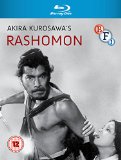 Rashomon (Blu-ray) | Blu Ray | (17/04/2019)
from £8.99
| Saving you £11.00 (122.36%)
| RRP
Rashomon (Blu-ray) | Blu Ray | (17/04/2019)
from £8.99
| Saving you £11.00 (122.36%)
| RRP This 1950 film by Akira Kurosawa is more than a classic: it's a cinematic archetype that has served as a template for many a film since. (Rashomon's most direct influence was on a Western remake, The Outrage, starring Paul Newman and directed by Martin Ritt.) In essence, the facts surrounding a rape and murder are told from four different and contradictory points of view, suggesting the nature of truth is something less than absolute. The cast, headed by Kurosawa's favourite actor, Toshiro Mifune, is superb. --Tom Keogh
![Akira Kurosawa - The Samurai Collection [DVD]](/pictures/1100983.jpg) Akira Kurosawa - The Samurai Collection | DVD | (07/06/2010)
from £35.19
| Saving you £4.80 (13.64%)
| RRP
Akira Kurosawa - The Samurai Collection | DVD | (07/06/2010)
from £35.19
| Saving you £4.80 (13.64%)
| RRP Akira Kurosawa: The Samurai Collection (5 Discs)
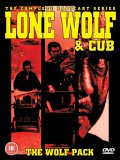 Lone Wolf And Cub | DVD | (01/01/2005)
from £N/A
| Saving you £N/A (N/A%)
| RRP
Lone Wolf And Cub | DVD | (01/01/2005)
from £N/A
| Saving you £N/A (N/A%)
| RRP A brilliant box set of the complete adventures of Lone Wolf and Cub! Sword of Vengeance (Dir. Kenji Misumi 1972): Framed for treason the executioner of the Shogun is stripped of office and declared an outlaw. Together with his infant son he sets out as a mercenary on a blood soaked journey of revenge against the secret society that murdered his wife and robbed him of his good name. With his life in ruins and literally believing that he is in hell he and his baby son have become Lone Wolf and Cub. Babycart At The River Styx (Dir. Kenji Misumi 1972): Ogami Itto is dead - 'Lone Wolf' lives on continuing his blood spattered journey through the land he calls Hell. As he remorselessly seeks the secretive shadowy Yagu clan they continue in their efforts to destroy him first sending their female warriors the vicious Akashi ninja. Beyond them barring his way the self proclaimed Gods of death sadistic warriors with a lust for blood. Lone Wolf must defeat them to justify the 500 pieces of gold that have bought his sword once more. Babycart to Hades (Dir. Kenji Misumi 1972): In a rare moment of compassion Lone Wolf rescues a girl who has killed a pimp in self defence. By his code he is forced to endure being tortured to within an inch of his life. Lone Wolf takes to the road again where his expertise is very much in demand so much so that a would-be employer has already placed a contract on him and the slayer with the babycart proceeds down the bloodstained path to Hades... Babycart In Peril (Dir. Kenji Misumi 1973): Lone Wolf (Ogami Itto) is separated from his Cub Daigoro in the course of a mission to find and kill the tattooed mistress of martial arts Oyuki. Daigoro is found at the mercy of a rival of his father Ogami Itto. Despite continuous harassment from Yagyu assassins Lone Wolf discovers Oyuki. Although he admires her he is contracted to destroy her and all this time the evil Lord Retsudo is coming closer to Lone Wolf bringing an army with him... Babycart In The Land Of Demons (Dir. Buichi Saito 1972): Hired to ensure that the succession of the clan passes to the legitimate heir the son of Lord Kuroda Lone Wolf becomes enmeshed in a web of intrigue that leads in turn to the Yagyu. Before he can break free he must turn against the very men who hired him the loyal retainers of the Kuroda clan... Babycart - White Heaven in Hell (Dir. Yoshiyuki Kuroda 1974): The climactic chapter in the Lone Wolf series! Ogami Itto the Lone Wolf and his Cub Diagoro face a new peril when the Yagyu clan leader Retsudo employs his blood thirsty daughter to destroy them once and for all. If she fails in her task Retsudo will unleash the supernatural might of the Yagyu army against which even the Lone Wolf cannot stand...
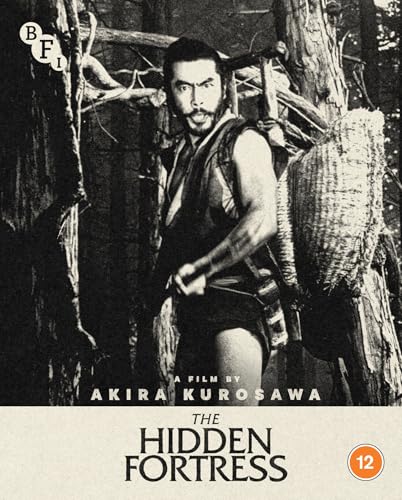 The Hidden Fortress (Blu-ray) | Blu Ray | (18/08/2025)
from £18.98
| Saving you £N/A (N/A%)
| RRP
The Hidden Fortress (Blu-ray) | Blu Ray | (18/08/2025)
from £18.98
| Saving you £N/A (N/A%)
| RRP New restoration of Kurosawa's much-loved classic. A story of rival clans, hidden gold and a princess in distress, The Hidden Fortress is a thrilling mix of fairy story and samurai action movie. It was Kurosawa's first film shot in the widescreen process of Tohoscope, and he exploited this to the full in the film's rich variety of landscape locations, including the slopes of Mount Fuji. The Hidden Fortress became Kurosawa's biggest box office hit to date and won several awards, including the Golden Bear at the 1959 Berlin Film Festival. Some twenty years on, the film's influence would have even greater impact on the world's box office, when George Lucas borrowed elements of its plot for the first of his Star Wars series. Extras Newly restored in 4K and presented in High Definition Newly recorded audio commentary by Japanese-cinema expert Tony Rayns Akira Kurosawa: It is Wonderful to Create Hidden Fortress (2002) Interview with George Lucas (2001, 8 mins) Original trailer **FIRST PRESSING ONLY** Illustrated booklet with a new essay on the film by Kenta McGrath
![Yakuza Law [Blu-ray]](/pictures/1149097.jpg) Yakuza Law | Blu Ray | (13/05/2019)
from £19.98
| Saving you £N/A (N/A%)
| RRP
Yakuza Law | Blu Ray | (13/05/2019)
from £19.98
| Saving you £N/A (N/A%)
| RRP Director Teruo Ishii (Blind Woman's Curse, Horrors of Malformed Men), the Godfather of J-sploitation, presents Yakuza Law (AKA Yakuza's Law: Lynching) a gruelling anthology of torture, spanning three district periods of Japanese history and to the screen some of the most brutal methods of torment ever devised. In this deep dive into the world of the Yakuza, meet the violent men who rule the Japanese underworld and the cruel punishments inflicted on those who transgress them. The carnage begins in the Edo Period with a violent tale of samurai vengeance starring Bunta Sugawara (Battles Without Honour and Humanity), before shifting to the Meiji Period as the exiled Ogata (Minoru Oki, Shogun Assassin) returns to face punishment for his past transgressions and, ultimately, to take his revenge. Finally, the action is brought right up to date with a tale of gang warfare set in then-present-day '60s Japan and headlined by Teruo Yoshida (Ishii's Orgies of Edo), as a powerful crime syndicate seeks bloody vengeance for the theft of one hundred thousand yen. Brutal, bewildering and definitely not for the faint-hearted, Yakuza Law represents Japanese popular cinema at its most extreme and most thrilling. Special Edition Contents: High Definition Blu-ray⢠(1080p) presentation Original lossless mono Japanese soundtrack Optional English subtitles New audio commentary by author and critic Jasper Sharp Erotic-Grotesque and Genre Hopping: Teruo Ishii Speaks, a rare vintage interview with the elusive director on his varied career, newly edited for this release Image gallery Reversible sleeve featuring original and newly commissioned artwork by Jacob Phillips FIRST PRESSING ONLY: Illustrated collector's booklet featuring new writing on the film by Tom Mes
![The Melancholy Of Haruhi Suzumiya Complete - Anime Legends [DVD] [2006]](/pictures/1100456.jpg) The Melancholy Of Haruhi Suzumiya Complete - Anime Legends | DVD | (24/05/2010)
from £N/A
| Saving you £N/A (N/A%)
| RRP
The Melancholy Of Haruhi Suzumiya Complete - Anime Legends | DVD | (24/05/2010)
from £N/A
| Saving you £N/A (N/A%)
| RRP Kyon thought that when he entered high school his days of believing in aliens time travelers and espers were going to be over. That is until SHE introduced herself. Claiming to be interested in only aliens time travelers and espers Haruhi Suzumiya was the strangest girl he has met in a long time. Before Kyon knew what's going on he has been dragged into her weird club and it looks like he is not the only one who has been drafted into this SOS Brigade of hers because there are three other students who don't seem to be so ordinary themselves! Contains the full first series in one boxed set packed with on-DVD extras!
![Dead Or Alive [1999]](/pictures/1006090.jpg) Dead Or Alive | DVD | (24/06/2002)
from £3.99
| Saving you £11.00 (275.69%)
| RRP
Dead Or Alive | DVD | (24/06/2002)
from £3.99
| Saving you £11.00 (275.69%)
| RRP The director of Dead or Alive, Takashi Miike, made his name on the international scene with Audition, a chilling psychological thriller that builds from a quiet start towards a prolonged torture sequence almost too unbearable to watch. But such deliberate pacing isn't typical of Miike, whose movies often assault the viewer with an onslaught of slam-bang action that makes John Woo look like Eric Rohmer. Dead or Alive, his most successful cops-vs-yakuza thriller to date, kicks off with six non-stop minutes of machine gun-paced violence, sex and slaughter, all set to a pounding heavy-metal beat. Thereafter things calm down a little, though not much. Given Miike's penchant for murky, livid-toned visuals and skewed camera angles, it's not always too easy to work out exactly who's doing what to whom, but the general outline's clear enough. The Tokyo underworld is being torn apart by a turf war between the yakuza gangs and the invading Chinese triads. Ambitious yakuza member Ryuichi isn't above playing both sides off against each other in his bid for power, while police detective Jojima, himself none too scrupulous in his methods, is out to destroy the gangs. Into this conventional plot framework Miike piles enough warped characters and bizarre, twisted happenings to fuel half-a-dozen Tarantino movies, while cheerfully borrowing--and inflating--key moments from such hard-boiled gangster-noirs as The Big Heat and Kiss Me Deadly. One character deep-fries his own hand, a stripper is drowned in a paddling-pool filled with her own excrement, and the literally apocalyptic finale, the showdown to end all showdowns, will leave you gasping. The appallingly prolific Miike, who regularly makes about five movies a year, has since directed two sequels--the first only three months after the original.--Philip Kemp
![Lone Wolf and Cub [The Criterion Collection] [Blu-ray] [Region Free]](/pictures/1142571.jpg) Lone Wolf and Cub | Blu Ray | (27/03/2017)
from £43.15
| Saving you £6.84 (15.85%)
| RRP
Lone Wolf and Cub | Blu Ray | (27/03/2017)
from £43.15
| Saving you £6.84 (15.85%)
| RRP The Cult Classic, Six-Film Series Based on the Internationally Best-Selling Japanese Manga Comics. Includes: SWORD OF VENGEANCE, BABY CART AT THE RIVER STYX, BABY CART TO HADES, BABY CART IN PERIL, BABY CART IN THE LAND OF DEMONS, WHITE HEAVEN IN HELL. Based on the best-selling manga series, the six intensely kinetic Lone Wolf and Cub films elevated chanbara to bloody, new heights. The shogun's executioner, Itto Ogami (TOMISABURO WAKAYAMA), takes to wandering the countryside as an assassinalong with his infant son Daigoro (AKIHIRO TOMIKAWA) and an infinitely weaponized perambulatorhelping those he encounters while seeking vengeance for his murdered wife. Delivering stylish thrills and a body count that defies belief, Lone Wolf and Cub is beloved for its brilliantly choreographed and unbelievably violent action sequences as well as for its tender depiction of the bonds between parent and child. SPECIAL EDITION BOX SET FEATURES: New 2K digital restorations of all six films, with uncompressed monaural soundtracks High-definition presentation of Shogun Assassin, the 1980 English-dubbed re-edit of the first two Lone Wolf and Cub films New interview with Kazuo Koike, writer of the Lone Wolf and Cub manga series and screenwriter on five of the films Lame d'un père, l'âme d'un sabre, a 2005 documentary about the making of the series New interview in which Sensei Yoshimitsu Katsuse discusses and demonstrates the real Suio-ryu sword techniques that inspired those in the manga and films New interview with biographer Kazuma Nozawa about filmmaker Kenji Misumi, director of four of the six Lone Wolf and Cub films Silent documentary from 1937 about the making of samurai swords, with an optional new ambient score by Ryan Francis Trailers New English subtitle translations PLUS: A booklet featuring an essay and film synopses by Japanese pop culture writer Patrick Macias
![Versus [Blu-ray]](/pictures/1153451.jpg) Versus | Blu Ray | (07/12/2020)
from £10.99
| Saving you £N/A (N/A%)
| RRP
Versus | Blu Ray | (07/12/2020)
from £10.99
| Saving you £N/A (N/A%)
| RRP A relentless one-of-a-kind sensory assault chock-full of hyper-kinetic fight scenes, gangster shootouts, sword-slashing violence and gory zombie horror, Versus was a key title amongst the barrage of innovative horror and action movies that appeared as if from nowhere from Japan at the turn of the millennium, leading to a new wave of appreciation for Asian extreme cinema. A mysterious face-off in a wooded clearing between two escaped convicts and a carload of sharply dressed yakuza holding a beautiful woman captive ends in hails of bullets and showers of blood. The location for this violent encounter is the mythic Forest of Resurrection, the site of the 444th portal of the 666 hidden gates that link this earthly domain to the netherworld and it didn't get this name for nothing. As one of the surviving prisoners escapes with the girl into the darkness of the forest, disgruntled gangsters soon become the least of their worries as an earlier battle between a lone warrior against hordes of zombie samurai is carried over from a millennium ago into the present day Versus caused a sensation both in Japan and internationally upon its release, launching the careers of director Ryûhei Kitamura (Godzilla Final Wars, Midnight Meat Train) and action star and fight choreographer Tak Sakaguchi (Battlefield Baseball, Yakuza Weapon). Arrow Video is proud to present this mythic cult title in both its original 2000 and expanded 2004 Ultimate Versus iterations, in a brand new, director-approved restoration. SPECIAL EDITION CONTENTS Brand new 2K restoration from original film elements by Arrow Films, approved by director Ryûhei Kitamura High Definition (1080p) Blu-ray⢠presentations of both versions of the film: the original 2000 cut and 2004's Ultimate Versus, featuring over 10 minutes of new and revised footage Reversible sleeve featuring original and newly commissioned artwork by Chris Malbon DISC 1: VERSUS Original lossless Japanese 5.1 and 2.0 stereo audio and English 2.0 stereo audio Optional English subtitles Audio commentary by Audio commentary by Kitamura, cast and crew Audio commentary by Kitamura and the cast and crew New visual essay on the career of Kitamura by Japanese cinema expert Jasper Sharp Behind Versus, a two-part behind-the-scenes documentary exploring the film's production First Contact: Versus Evolution, a featurette exploring the film's origins Tak Sakaguchi's One-Man Journey, an archival featurette on the actor's visit to the 2001 Japan Film Festival in Hamburg Film festival screening footage Team Versus, a brief look inside the Napalm Films office Deep in the Woods, an archival featurette featuring interviews with Kitamura, cast and crew The Encounter, an archival interview with editor Shûichi Kakesu Deleted scenes with audio commentary by Kitamura, cast and crew Nervous and Nervous 2, two side story mini-movies featuring characters from the main feature Featurette on the making of Nervous 2 Versus FF Version, a condensed, 20-minute recut of the film Multiple trailers Image gallery DISC 2: ULTIMATE VERSUS Original lossless Japanese 6.1 and 2.0 stereo audio and English 6.1 and 2.0 stereo audio Optional English subtitles Audio commentary by Kitamura, cast and crew Sakigake! Otoko versus Juku, a featurette on the newly shot material for Ultimate Versus FIRST PRESSING ONLY: illustrated collector's booklet featuring new writing on the film and a reprinted interview with Kitamura by Tom Mes, and notes on the making of the film by Kitamura
![Throne Of Blood [1957]](/pictures/1003692.jpg) Throne Of Blood | DVD | (22/10/2001)
from £12.61
| Saving you £7.38 (58.52%)
| RRP
Throne Of Blood | DVD | (22/10/2001)
from £12.61
| Saving you £7.38 (58.52%)
| RRP A champion of illumination and experimental shading, Kurosawa brings his unerring eye for indelible images to Shakespeare in this 1957 adaptation of Macbeth. By changing the locale from Birnam Wood to 16th-century Japan, Kurosawa makes an oddball argument for the trans-historicity of Shakespeare's narrative; and indeed, stripped to the bare mechanics of the plot, the tale of cut-throat ambition rewarded (and thwarted) feels infinitely adaptable. What's lost in the translation, of course, is the force and beauty of the language--much of the script of Throne of Blood is maddeningly repetitive or superfluous--but striking visual images (including the surreal Cobweb Forest and some extremely artful gore) replace the sublime poetry. Toshiro Mifune is theatrically intense as Washizu, the samurai fated to betray his friend and master in exchange for the prestige of nobility; he portrays the ill-fated warrior with a passion bordering on violence, and a barely concealed conviviality. Somewhat less successful is Isuzu Yamada as Washizu's scheming wife; her poise and creepy impassivity, chilling at first, soon grows tedious. Kurosawa himself is the star of the show, though, and his masterful use of black-and-white contrast--not to mention his steady, dramatic hand with a battle scene--keeps the proceedings thrilling. A must-see for fans of Japanese cinema, as well as all you devotees of samurai weapons and armour. --Miles Bethany
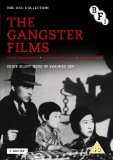 Ozu Collection - The Gangster Films (2-DVD) | DVD | (18/03/2013)
from £25.65
| Saving you £4.34 (16.92%)
| RRP
Ozu Collection - The Gangster Films (2-DVD) | DVD | (18/03/2013)
from £25.65
| Saving you £4.34 (16.92%)
| RRP The latest volume in the BFI's ongoing releases of the works of Japanese master Yasujiro Ozu focuses on his crime films. These rare, silent works mix the thrills of western filmmaking with compositions that served as a forerunner to his renowned, mature, post-war style. All films are here presented with newly commissioned scores by Ed Hughes. Episode Comprise: Walk Cheerfully That Night's Wife Dragnet Girl Special Features: The only surviving fragment of A Straightforward Boy
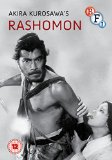 Rashomon (DVD) | DVD | (21/09/2015)
from £18.48
| Saving you £3.27 (19.56%)
| RRP
Rashomon (DVD) | DVD | (21/09/2015)
from £18.48
| Saving you £3.27 (19.56%)
| RRP This 1950 film by Akira Kurosawa is more than a classic: it's a cinematic archetype that has served as a template for many a film since. (Rashomon's most direct influence was on a Western remake, The Outrage, starring Paul Newman and directed by Martin Ritt.) In essence, the facts surrounding a rape and murder are told from four different and contradictory points of view, suggesting the nature of truth is something less than absolute. The cast, headed by Kurosawa's favourite actor, Toshiro Mifune, is superb. --Tom Keogh

Please wait. Loading...
This site uses cookies.
More details in our privacy policy